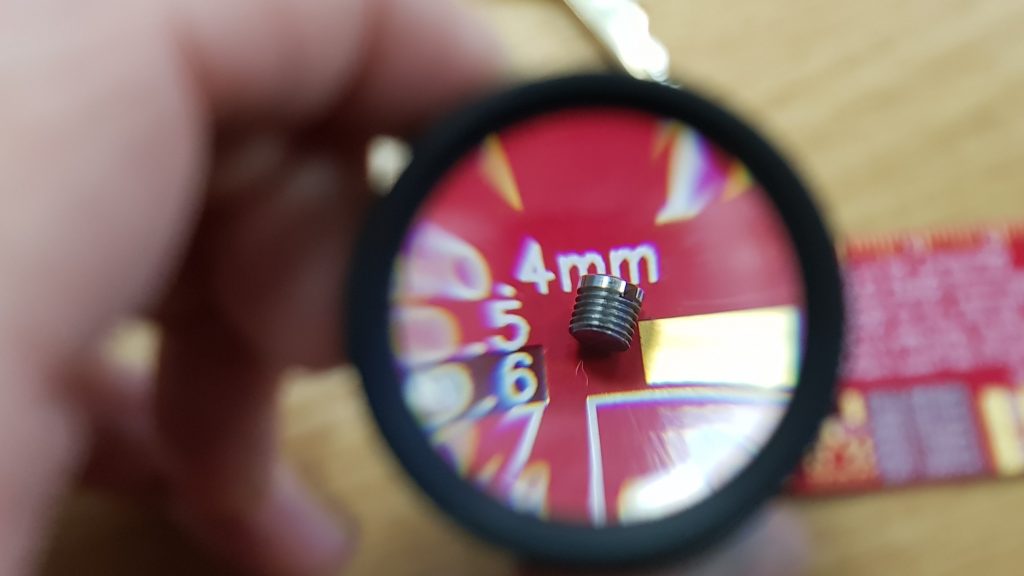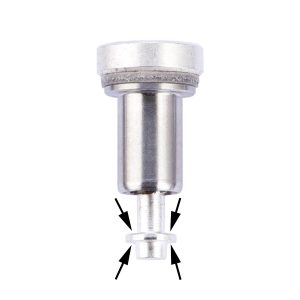Our GT3 tips, whether for foil or epee, are the most carefully engineered on the planet. We have gone to extraordinary lengths to try to make sure that they are reliable, robust and above all else buttery smooth.
Ahead a few tips by our director Alex Paul (with the input from top-ranked foil fencer Richard Kruse!) to help you get the best from them.
How to take care of your foil points
by Alex Paul
Points are pieces of precision engineering, typical manufacturing tolerances are nowhere near tight enough to make a point. You are looking at the kind of machining that is reserved for watchmaking in order to get a point that is reliable and smooth. If you look at a
tip screw for example and actually consider how the threads are cut you are left scratching your head...
 How do they make that?!?
How do they make that?!?
Well, I am afraid that I can't tell you but I can tell you a few simple things that will get the best from your point.
I have worked these top tips up in conjunction with world number one foilist
Richard Kruse. He has been at the top of the foil game for decades and comes to the shop before every event to do his own weapon check. He is a meticulous guy and before each competition he can be found in our dispatch department checking over his weapons and chatting to the guys in the warehouse.
So, here you go:
1. Super smooth action - Keep it clean
Our
points are the only ones on the market that have both their bearing surfaces polished. This makes them super smooth and the smoothness just gets better with use. My top tip is never to ever consider using any lubricant. Anything you put in the tip will eventually attract dirt and make the point gritty. Keep the point clean using a cotton bud preferably with some electrical contact cleaner (commonly available as Isopropyl alcohol or IPA).
2. While you are there clean the contact
By this I don't mean the cup that the spring sits on at the bottom of the
barrel, I mean the point on the
tip where the grub screws sit and make your electrical switch. Get your contact cleaner on a piece of tissue and use your finger nail to run round the
[caption id="attachment_1814" align="aligncenter" width="300"]

Clean the top and bottom surfaces where the tip screws and spring sit[/caption]
3. Don't stretch the spring - Replace it
If the weapon starts to fail the weight test you can stretch the
spring in a pinch as TEMPORARY measure. However; once you start doing this the spring has been stressed past its elastic limit and it will hold weight for a shorter and shorter period. To minimise your work and maintenance time just replace the spring wherever possible.
4. Screws
Where other points have
screws that stick out and get damaged ours are countersunk into the barrel
(that is, by the way, one of the main differences between the "German style" foil tip and our British foil tips.) This helps protect them but of they are looking damaged rather than risk getting it stuck in there replace the screw.
5. Durability
Most fencing companies sell a reamer that you can use to ream out your point to get it back to round if it gets dented. We don't... This fact alone says everything you need to know about the durability of our
barrels! You should never get a dented barrel with an LP foil point. If you do then e mail us and
we will replace it for free.
6. Tape
Many people don't know this but since the timing changes in 2005 many of the perceived "bounce outs" that are seen in foil are caused by bad tape.
The foil circuit is looking for a break in the switch that is the foil point when it detects a break it starts a timer and if the circuit is re made in less than 14ms =/-1ms then no light comes on.
If you do a direct hit to someones chest and the blade then bends so that the body of the blade is touching the lame jacket this "shorts" the hit and no hit is registered.
"Tape, TAPE, TAPE!" people.
If there is one thing you can do to help yourself out before an event it is to check and replace your
tape (it's available even in a
coloured version to match your club uniform,
fencing bag or
socks). It could gain you a hit every bout!
OK, so there you go that is our top 6 tips for happy foil fencing :)
In fact there is one more thing that Richard does before every event, he rubs his
guard down with sandpaper or an abrasive cleaning block. Whether or not you chose to go to those lengths is up to you but I suppose it seems to be working for him so maybe you should...
 How do they make that?!?
Well, I am afraid that I can't tell you but I can tell you a few simple things that will get the best from your point.
I have worked these top tips up in conjunction with world number one foilist Richard Kruse. He has been at the top of the foil game for decades and comes to the shop before every event to do his own weapon check. He is a meticulous guy and before each competition he can be found in our dispatch department checking over his weapons and chatting to the guys in the warehouse.
So, here you go:
How do they make that?!?
Well, I am afraid that I can't tell you but I can tell you a few simple things that will get the best from your point.
I have worked these top tips up in conjunction with world number one foilist Richard Kruse. He has been at the top of the foil game for decades and comes to the shop before every event to do his own weapon check. He is a meticulous guy and before each competition he can be found in our dispatch department checking over his weapons and chatting to the guys in the warehouse.
So, here you go:
 Clean the top and bottom surfaces where the tip screws and spring sit[/caption]
Clean the top and bottom surfaces where the tip screws and spring sit[/caption]

